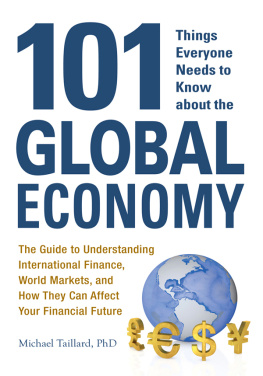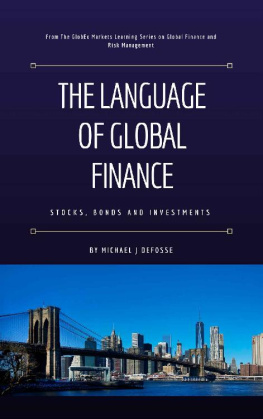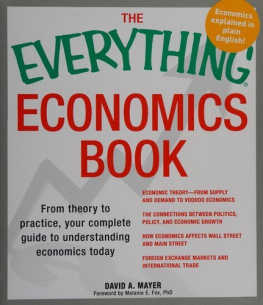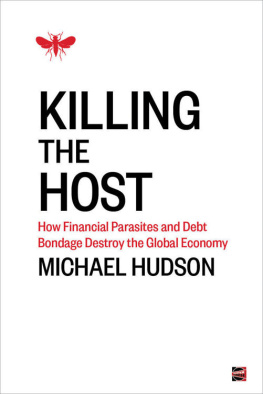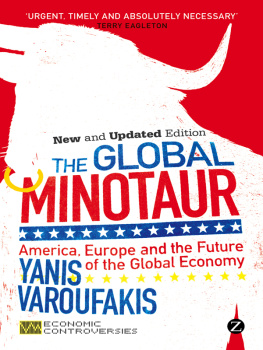This book is dedicated to my children, Dante, Gabriel, Katherine, and Amelia. It is my hope that this book will help people to make better decisions than those being made today.
INTRODUCTION
Think back to the last time you bought a car. Of course, you were interested in questions like, What kind of mileage does it get? Whats its safety record? And does it come in a really cool shade of red with a bitchin CD player?
But you also might have wondered if it was built in America. Was it from the assembly lines of the Big ThreeGeneral Motors, Ford, or Chrysler? Was it the product of American workers, or were you contributing in some small way to shipping those manufacturing jobs overseas?
These days, more and more people ask themselves questions such as these. But the reality is that the vehicle you drive, regardless of what companys name is on it, is composed of the parts and labors of many nations. It was, perhaps, assembled in Mexico, with parts from China and electronics from Taiwan, fashioned from natural resources extracted from South Africa, using engineering specifications from Germany, and fueled with oil from Saudi Arabia. In truth, almost nothing thats a part of our lives comes from only one country. These things are all interconnected in complex ways, and each international connection influences a range of things, from the amount of money you make at work to where you live. Call it the Economic Butterfly Effect. The price of rice in China really does influence your credit cards interest rates, but if you dont know why, theres little you can do to prepare.
Global economics studies those relationships between people of different geographic locations as they participate in economic transactions. The dynamics of the economic relationships between nations, or even between different parts of a single nation, present risks and benefits to you. The better you understand these relationships, the more successfully youll be able to adapt to the changes that are occurring daily in your life: everything from gas prices to your customer service experience at a department store.
The mechanisms by which these economic transactions take place and influence other transactions are varied, but they occur at every geographic and economic level. You might want to Buy American in the hope of saving American jobs and contributing to our national prosperity. But in truth, you might as well try to narrow yourself down to purchasing all your goods at a single store. It wont do you much good. Not only is it just about impossible, but even if you could do it, the store owner doesnt want to sell exclusively to you and no one else.
For better or worse, today we live in a global society. The world wont disappear just because you close your eyes. Instead, globalism presents us with a world of opportunities if we can see them. As Americans expand our range of possible transaction partners, the potential benefit for everyone increases.
The risks associated with globalism dont lie in trading with other countries and in buying goods that are made elsewhere. Rather, theyre in being unprepared for what the world has available. When you understand how people behave in their attempts to make the best use of the planets scarce resources, youll have a greater understanding of how the global community affects your life and what you can do to adapt to an ever-changing world.
CHAPTER 1
The Basics
Issues in global economics are common news stories, but its sometimes difficult to find out what any of it actually means. Even though those current events are among the most important in your life, the people who give you the news often dont know or explain how these issues will affect you.
This is why we should start with the basics. Not only is everything else in global economics built upon these fundamentals, but even these most basic principles impact our daily lives. Unless you know what youre looking for or how to properly respond, youre at the mercy of the ebb and flow of the economic tides that reach across the globe.
1. GLOBALIZATION
Globalization refers to both the increasing integration of the worlds nations and the process by which that integration occurs. Although globalization is not a new conceptthere are major international trade routes dating back at least as far as 2,000 B.C. trends in technological advancements and cross-border issues have dramatically increased the degree to which far-separated locations on the earth have become interconnected, both economically and otherwise. Much of what contributes to the increased globalization is attributed, rightfully or not, to the efforts of governments as they work to coordinate agreements and treaties that facilitate these international interactions (the development of trade blocs such as the European Union, for example). The reality, however, is that globalization often occurs independent of any government policy.
Increasing globalization is inevitable; it affects all industries and all nations. What is its real cause? In a word: technology. As we make improvements in our ability to communicate instantly across long distances and more quickly transport people and cargo, our ability to take advantage of the benefits of associating with foreign nations increases. Not only have these technological advances made it faster and more convenient to buy and sell goods across the globe, but its also cheaper because were improving the cost efficiency of communication and transportation, as well as decreasing the risks associated with transporting goods over long distances.
Consider such new technology as the cargo jet, the computer, or even just the telephone. Because of these inventions, to place an order we no longer have to send a letter overseas (where it can easily go astray). We dont have to pay a higher price to cover the risk that the company were buying from might lose shipments to storms or bandits.
Globalization is a fact, but like many facts, it isnt all good or all bad. For example, pollution crosses national boundaries without concern for what policies are in place to limit international trade. The airborne carbon from a Chinese coal power plant is dispersed through the global atmosphere just as easily as the ash from an Icelandic volcano or the fallout from a nuclear bomb. At the same time, research and trade in information goes on daily between nations using informal or unofficial channels.
Globalization means we can better take advantage of a greater range of markets to which we can sell our goods or from which we can purchase our supplies. Economists study and try to explain human behavior in their relations with one another. Globalization is an inevitable result of our own attempts to maximize the value of our transactions. It has increased during the past few decades as a result of technological advances, and so has global economic interdependence.
What You Should Know
If you buy something from someone on the other side of the planet, the principles are still the same as if you were trading with someone across the street. National boundaries are artificial barriers that add complexity to our transactions (which will be discussed in later chapters), but other than the sheer distance involved, the transactions themselves are no different.

